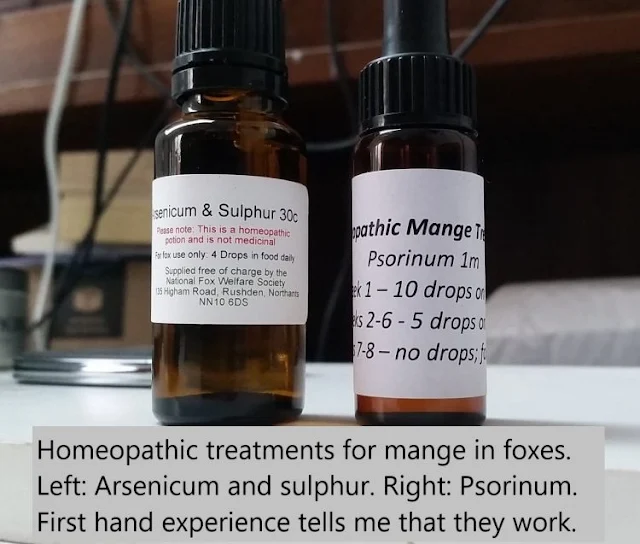It seems to me that very few people believe in homeopathy as a treatment for cats, companion animals and their human owners. Dr. Bruce Fogle in one of his books, Natural Health Care, refers to homeopathy. He says an extensive review has been published in the British Medical Journal in 1991. The review analysed 107 controlled studies involving homeopathic medicines as treatments on cats under the heading of natural cat care.
 |
| Homeopathy works in my view. This treatment works in curing mange in foxes. Photo: MikeB. |
He concluded that the studies were not well-designed but despite that 81 of the studies showed that homeopathic medicines were effective while 24 showed that they were ineffective and two were inconclusive. In 1994 a double-blind study published in the medical journal The Lancet concluded that homeopathy was better than a placebo in treating hay fever. However, no good studies of homeopathic medicines have been carried out on cats.
Dr. Fogle says that the number of veterinarians using some homeopathic remedies are increasing in Europe, North America and Australasia. He does say, though, that the vets who use homeopathy do so because they are willing to accept evidence from owners who swear by the treatments and they are so dilute that they can do no harm.
I would like to throw my hat into the ring on this one. I know that homeopathy works as a treatment. This is from first-hand experience. I have treated a number of foxes with mange which causes extensive hair loss most often on their tail and intense itching. It is distressing to see.
You simply add half a dozen drops of this treatment (see above) to their food and over a period of about two months the mange is completely cured. I have seen it with my own eyes. I swear by it and the fox charity who provided me with the homeopathic treatment knows that it works because they send out this product to countless thousands of people who report back with their success stories.
If you're interested in this fox mange treatment then please click on this link.
Dr. Bruce Fogle explains how homeopathy works. He states that the body is in a constant state of self-repair. The organs of the body and cells renew themselves constantly. Homeopaths believe that a vital force regulates the body to maintain health. Homeopaths work out how the body is trying to defend itself and they prescribe treatment on the basis of "like cures like". The remedy stimulates self-healing rather than suppressing the signs of the disease. "Like cures like" has also been called the "law of similars". It is the central principle of homeopathy.
The remedies are substances which if taken undiluted by a healthy person would cause symptoms similar to those of the of the disease being treated. So, for example, if a person is being treated for local skin irritation the homeopathic treatment is poison ivy but highly undiluted. Highly diluted poison ivy would be a suitable homeopathic treatment for flea bites in cats, for example.

Thank you for posting this great article on homeopathy. Coming from India, I am a great believer of this wonderful holistic modality. I had never tried it on my cats, though, until recently, when I treated my kitty for a nasty rash around her neck. Sulphur was the answer. The rash disappeared with just a couple of doses.
ReplyDeleteThanks for sharing your thoughts. We have the same feelings about homeopathy. I wouldn't support it but for the fact that it works on foxes! That's good enough proof for me. I am trying it at the moment for sinusitis - human sinusitis!
Delete